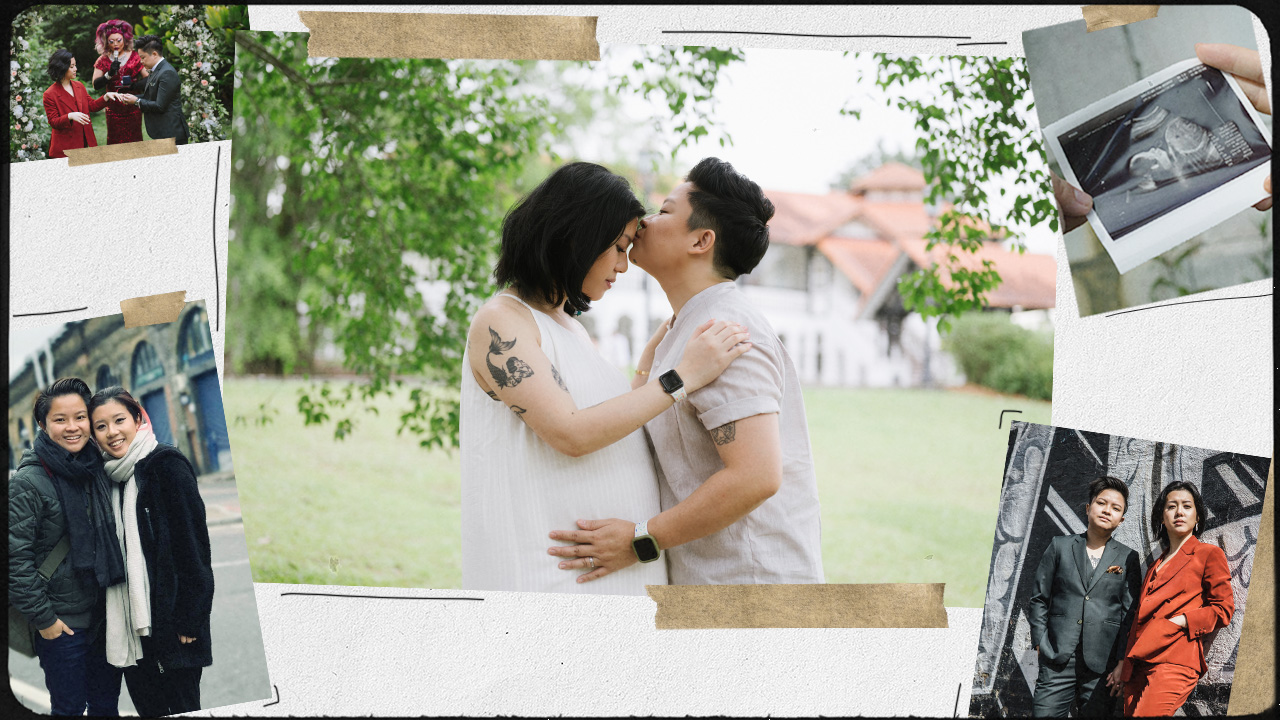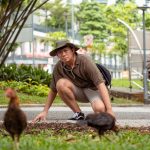All images by Shiva Bharathi Gupta for RICE Media
Cally Cheung carefully makes her way to the sofa and settles beside her wife, Ching Sia. The couple had just returned home from a busy day. Potted plants dangle from their window, gently rocking back and forth to the breeze. A pile of records lies in the corner of the living room of their 3-bedroom apartment in Tanjong Katong.
It’s a cosy living space—one that will welcome a new baby cot in the upcoming months for their bundle of joy. Cally, 28, expects to deliver her baby in mid-August this year.
ADVERTISEMENT
Ching had just returned from Melbourne, Australia, with books for the newborn. “The books cost about $300. They weigh about 40 kilograms,” Ching, a 40-year-old realtor, explains with anticipation.
“All the books are about different types of families, different skin colours; very progressive books. A lot of them cannot be found in Singapore.” Sunlight from the merciless June sun filters into the living room. The array of plants lining their windows can only do so much to keep the heat out.
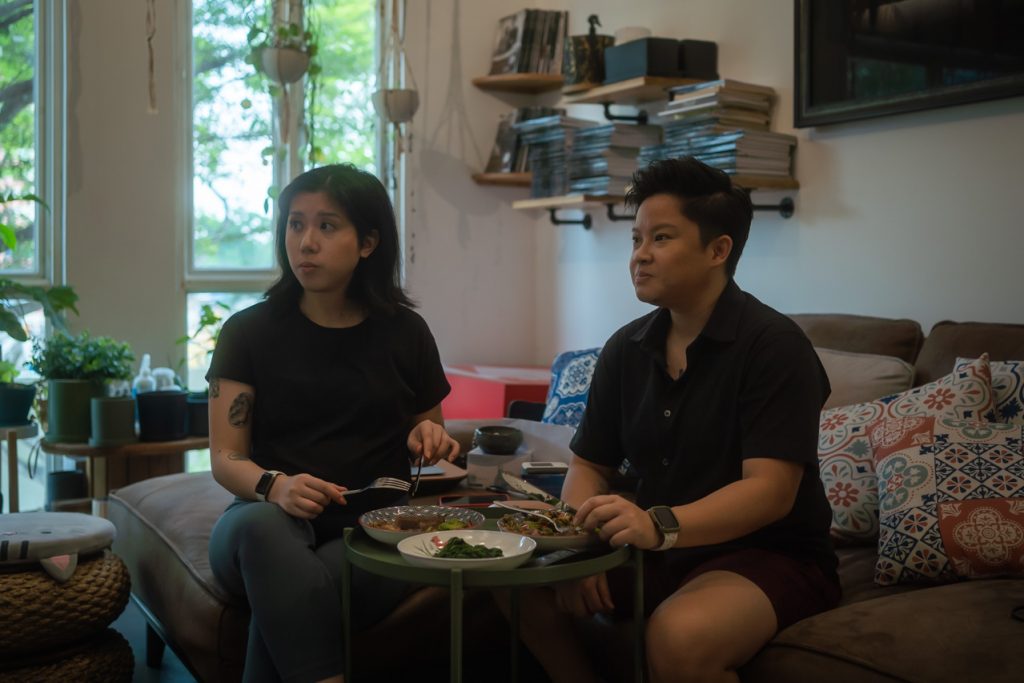
June has always been a busy month for both Cally and Ching. This year has been especially busy. Between regular health check-ups with their gynaecologist and dealing with the mid-year searing heat, Ching and Cally are hard at work organising events for Pride Month.
Both are plugged into Singapore’s LGBTQ+ community. Ching is part of the organising committee for this year’s Pink Dot—she’s been part of the organising committee for the past 10 years. Cally is the co-founder of Prout, a social and support platform for the local LGBTQ+ community.
“Obviously, we have books which say something like Mummy, Mama, and I,” Cally adds. They’ve invested much thought into how they’ll raise their kid in Singapore—a child of queer parents.
“We plan to be straightforward with the kid and explain that there are different types of families. Of course, the kid will also have a godfather.”
The couple registered their marriage in Melbourne in September 2022 in an intimate signing ceremony in front of the Royal Exhibition Building. In Australia, they are legally married. In Singapore, however, the laws do not afford them the same legal recognition.
When the wheels of their return flight from Melbourne screeched on the tarmac of Changi Airport, the married couple are legally considered friends at best.
A Modern Love Story
Their first introductions to each other, shaped in the mould of all modern love stories, happened on Tinder in 2018. Ching’s profile was filled with personal details. Cally’s introduction to Ching, on the other hand, contained only three words in her description: “I like girls”.
At the time, Ching was 35 years old. Cally was 23 at the time.
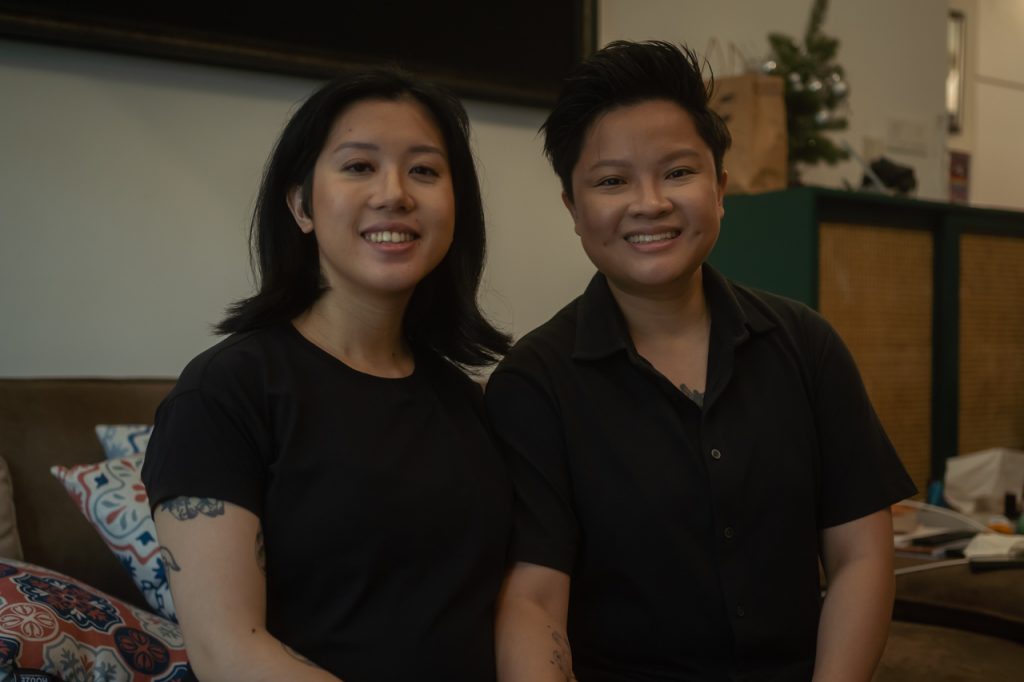
They met at Plaza Singapura to watch Black Panther on their first date. “After the movie, we went to the basement. Ching turns around and tells me she’s going to get water from Guardian. Who the hell does that?” Cally jokes.
ADVERTISEMENT
“Just a few steps away is Cold Storage. You can get water there at 40 cents. Guardian charges you two dollars. I thought she was irresponsible. So I went to get the water [at Cold Storage] for her.”
Princess, their cat, rises from its siesta and strolls into the living room. Ching chuckles at the memory. Her wedding speech featured the same first date story. She envisioned a possible future with Cally because of that very interaction.
Their relationship blossomed. They dated for one and a half years before Ching proposed to Cally in Bhutan in 2019.
While Cally was distracted by the gorgeous landscape, Ching got down on one knee and proposed. A rainbow had just formed, wrapping the newly engaged couple under its arc while they celebrated their engagement.
The couple’s love story is just like any other, except for the fact that they have to prove their union to faceless bureaucracies.
“We do a lot of things to show that we are in a relationship. We need evidence to show we’re a unit—our marriage registration, wills and a lasting power of attorney. It’s morbid having to collect all this information to prove that my partner is someone to me,” Cally remarks.
Her attention shifts to her cat, which has now scaled a high stool. “During the pandemic, I told Ching that maybe we weren’t ready to have a child yet,” Cally offers.
Ching had always wanted children. In fact, she told Cally she wanted kids on their second date. Ching was enamoured with the idea of bringing up a good human being. However, she readily accepted that she needed to work on herself before starting a family with her wife.
“It’s about passing down the intergenerational trauma. We didn’t want to do that,” Ching elaborates.
“For us, it can never be an accident to have a child. It’s a conscious effort to bring a child into this world. We want to bring our best selves into this.”
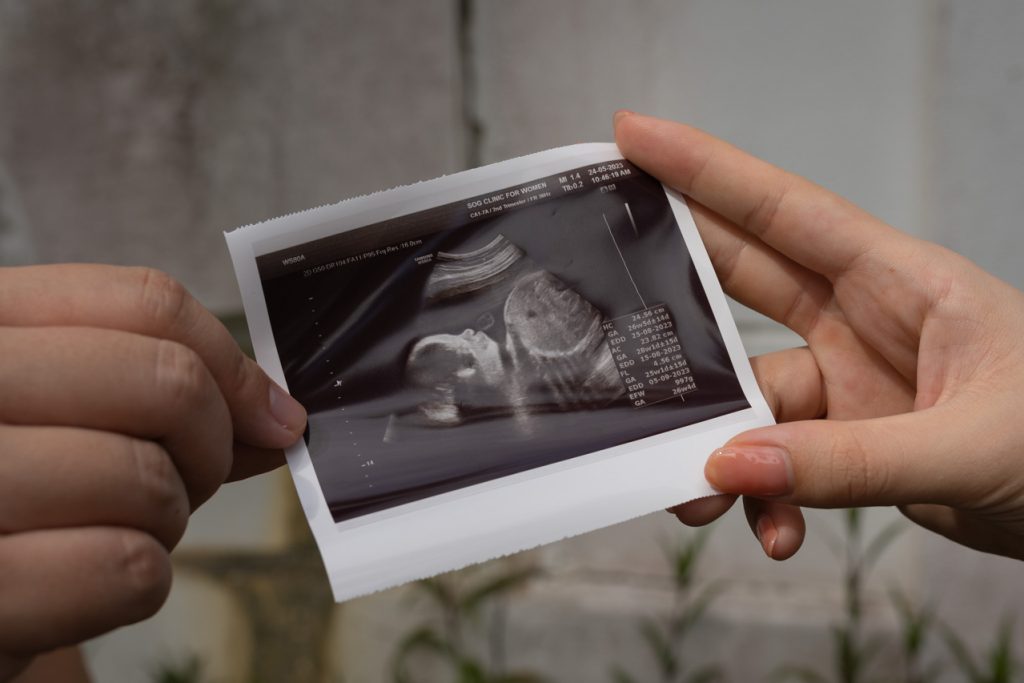
It Takes A Village
Their journey to conceiving a child together was a bumpy ride. The price of cai fan continues to surge, along with everyday stressors. Having children (in this economy?) plunges down the list of priorities Singaporeans have in their minds.
Cally and Ching will also have to contend with national policies that prioritise a ‘traditional’ family nucleus over others. Since Cally is considered a single unwed mother in Singapore, her child will be seen as illegitimate.
According to Singapore law, a child is considered legitimate only if they are “born or conceived during the existence of a valid marriage between their biological parents”.
“My biggest fear is that if Cally drops dead, the child is no one to me according to the law,” Ching explains.
“And if I drop dead and don’t have a will, who is going to look after Cally and the child? These are valid things that we have to be mindful of all the time.”
To legitimise the child, Cally will have to adopt her own biological child after she delivers. Singapore Legal Advice explains that a biological parent adopting their child means that the “other biological parent may no longer exercise custody over that child”.
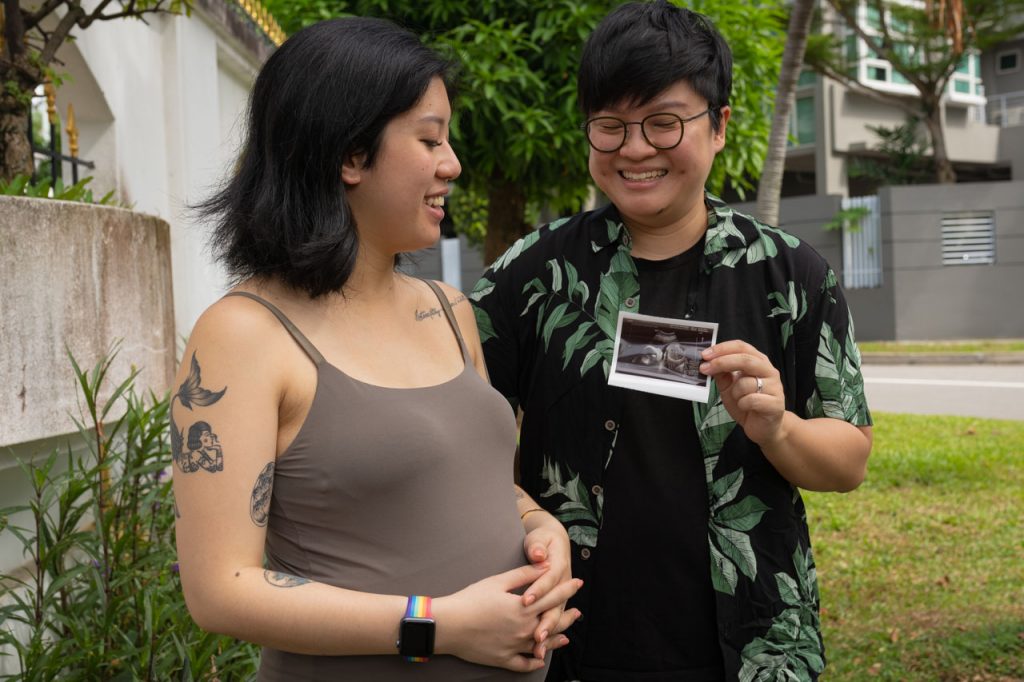
Ching and Cally are still a family unit—Ching would very much like to have custody over her child. Legal and administrative problems plagued the couple long before they decided they were ready to have a kid.
It took two years after the pandemic for the couple to take a leap of faith. Plunging headfirst into the gamut of legal and administrative messes, the couple made the decision to start a family.
“I started the conversation early last year. After the pandemic, I thought we were ready to have a child,” Cally reflects.
Making A Baby
More obstacles stood in their way. The couple were not permitted to go through the IVF process here—single unmarried women were not allowed to do so in Singapore.
Instead, they flew to Melbourne, Australia. The process was costly—each round of egg harvesting costs at least S$10,000. The IVF process is another S$10,000.
“In Australia, you cannot buy sperm. You can just hope that the donor wants to donate out of the goodwill of their heart,” Ching explains. “I remember refreshing the webpage which kept track of sperm donors every day to see whether a suitable person had donated.”
They waited six months for a donor—a 26-year-old Australian who was relatively healthy. “We also have to consider how healthy the donor is. Underlying genetic issues we’re not aware of is a real problem.”
A six-month waiting time pales in comparison to some of their friends. Similar couples who wanted to start families waited anywhere between two to three years for a donor they were comfortable with.
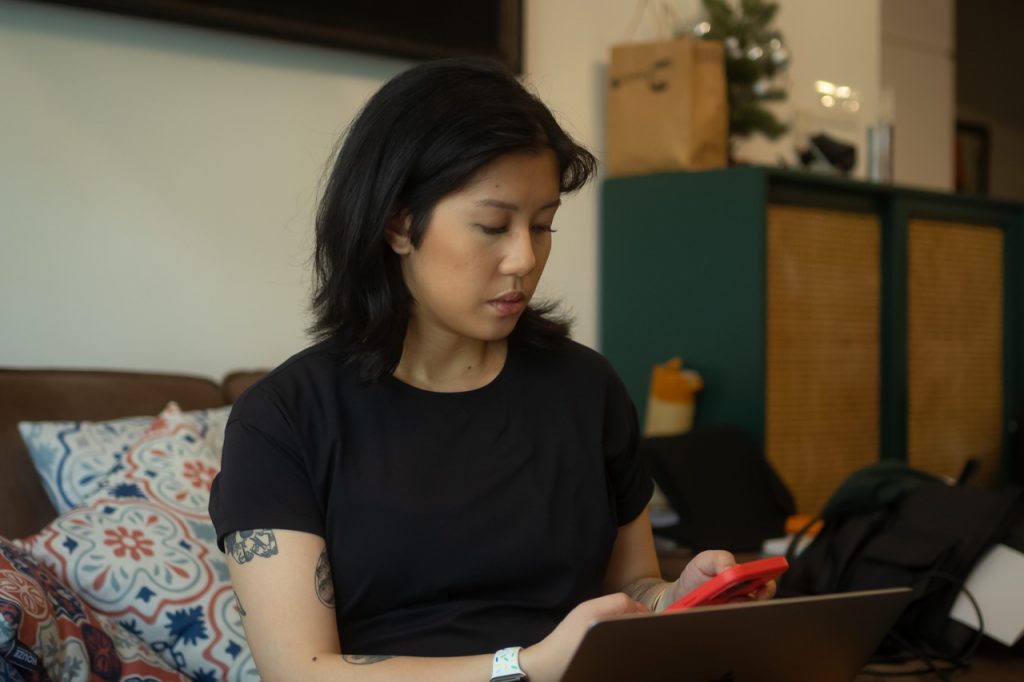
“Of course, we’re very privileged, and we acknowledge that. Everything was super expensive. And I wouldn’t be able to do it because of our lifestyle. If I worked in an office job, I wouldn’t be able to fly around,” Cally remarks.
Less privileged couples, on the other hand, might have to give up their dreams of having their own children.
Starting a family is important enough for Cally and Ching to traverse such lengths to start one, even as their family unit falls outside of Singapore’s societal norms.
Valuing All Families
“We hope that there will be structures to protect all types of families,” Cally says.
“Legal recognition is also about stability. People from any kind of background and community need that stability to be functional citizens.”
The couple will continue their preparations for their baby and Pride Month. They will have to be up early tomorrow morning for an ultrasound scan with their gynaecologist.
“We’re just like any other couple that wants kids. What I hope to do with Cally is to bring up a decent human being. We don’t expect them to be a doctor or a lawyer, just a good person,” Ching explains.
And while the journey towards conceiving a child was difficult, the couple have yet to begin one of their greatest adventures in life: Parenthood.
Like all other parents in Singapore, they’re willing to go the distance, united by a universal thread that runs through all parents: a love for their child.

